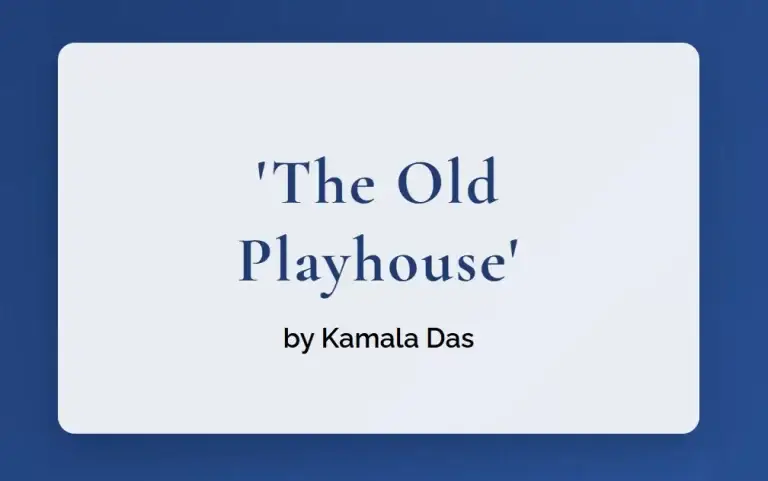“The Old Playhouse” stands as one of Kamala Das’s most searing critiques of traditional marriage, using the metaphor of a stifling playhouse to represent matrimonial bondage. Written during India’s post-independence period, the Old Playhouse reflects both personal experience and broader social commentary on the institution of marriage in patriarchal society.
Table of Contents
The Opening Flight in The Old Playhouse
The poem begins with an accusation wrapped in metaphor:
You planned to tame a swallow, to hold her
In the long summer of your love so that she would forget
Not the raw seasons alone, and the homes left behind, but
Also her nature, the urge to fly, and the endless
Pathways of the sky.
These initial lines establish multiple layers of meaning. The swallow symbolizes not just freedom but specifically feminine freedom – wild, natural, and untamed. The “long summer of your love” suggests both the warmth of affection and its potentially suffocating nature. The mention of “raw seasons” and “homes left behind” speaks to the broader experience of Indian women leaving their maternal homes for marriage.
The Architecture of Oppression
Kamala Das constructs a claustrophobic atmosphere through vivid imagery, moving from the open sky of the swallow to increasingly confined spaces:
It was not to gather knowledge
Of yet another man that I came to you but to learn
What I was, and by learning, to learn to grow, but every
Lesson you gave was about yourself.
This passage reveals the speaker’s initial hopes for marriage as a path to self-discovery and growth, hopes that are systematically destroyed by masculine egotism. The repetition of “learn” emphasizes the educational aspect of marriage – but it’s an education in diminishment rather than development.
Physical and Psychological Confinement
The poem’s most powerful lines describe the transformation of the speaker, employing domestic imagery that becomes increasingly sinister:
You called me wife,
I was taught to break saccharine into your tea and
To offer at the right moment the vitamins.
Cowering Beneath your monstrous ego I ate the magic loaf and
Became a dwarf.
The progression from “wife” to “dwarf” tracks the systematic diminishment of the feminine self. The domestic details – saccharine, vitamins, tea – become weapons of reduction. The “magic loaf” introduces a fairy tale element, but one that’s been perverted: instead of transformation leading to liberation, it leads to further shrinking of the self.
The Playhouse as Prison
The central metaphor crystallizes in a series of powerful images:
The strong must live, I know the blunt jokes
You tell to hide your guilt, your crime against my trust,
Against the light that innocence had lit.
Now shut your eyes, and sit still
With your bandaged hungering body in the darkness
Of the brooding air.
Here, Kamala Das layers multiple forms of confinement – physical, emotional, and spiritual. The “bandaged hungering body” suggests both restraint and wound, while the “brooding air” creates an atmosphere of oppressive stillness.
Environmental Symbolism
The poem’s environmental imagery creates a stark contrast between natural and artificial states:
Sweet is the air that we breathe in the playhouse,
But it is close and it is warm, with artificially
Heated thoughts and calls of artificial love.
The artificial warmth and sweetness represent the false comfort of conventional marriage, contrasting sharply with the natural world symbolized by the swallow in the opening lines. The repetition of “artificial” emphasizes the constructed nature of marital roles and expectations.
The Final Transformation
The poem concludes with a devastating image of complete domestication:
I am a trained circus- animal in the ring of your world, well-tamed to
Admire your vast pride, your clever brain.
This final transformation – from swallow to circus animal – completes the arc from freedom to captivity. Yet there’s a bitter irony in these lines: the speaker’s awareness of her own diminishment becomes a form of resistance. The very act of naming her condition suggests a consciousness that refuses complete erasure.
Literary and Historical Context
Kamala Das wrote “The Old Playhouse” during a period of significant social change in India. The poem reflects both personal experience and broader social commentary on the institution of marriage in patriarchal society. Its themes resonate with the emerging feminist consciousness of the 1960s and ’70s, both in India and globally.
The poem’s technical mastery lies in its sustained metaphor of the playhouse, which works on multiple levels:
- As a physical space of confinement
- As a metaphor for the institution of marriage
- As a stage where wives must perform prescribed roles
- As a site of artificial environment and emotion
Throughout “The Old Playhouse,” Kamala Das masterfully weaves personal experience with universal themes of freedom, identity, and power. Her unflinching examination of marriage as an institution that often demands the sacrifice of feminine identity resonates well beyond its immediate Indian context, speaking to universal experiences of confinement and the human cost of patriarchal structures. The poem stands as both personal testimony and political statement, its power lying in the precision of its imagery and the depth of its psychological insight.
Further Reading
For more insights into Kamala Das’s poetic genius, explore these analyses:
- The Sunshine Cat – Another powerful exploration of feminine identity and marital disillusionment
- The Freaks – A bold examination of love and physical intimacy
- An Introduction – Das’s seminal work on identity and self-expression
- My Mother at Sixty-Six – A touching portrayal of aging and familial bonds
- The Looking Glass – A frank exploration of love and physical desire


